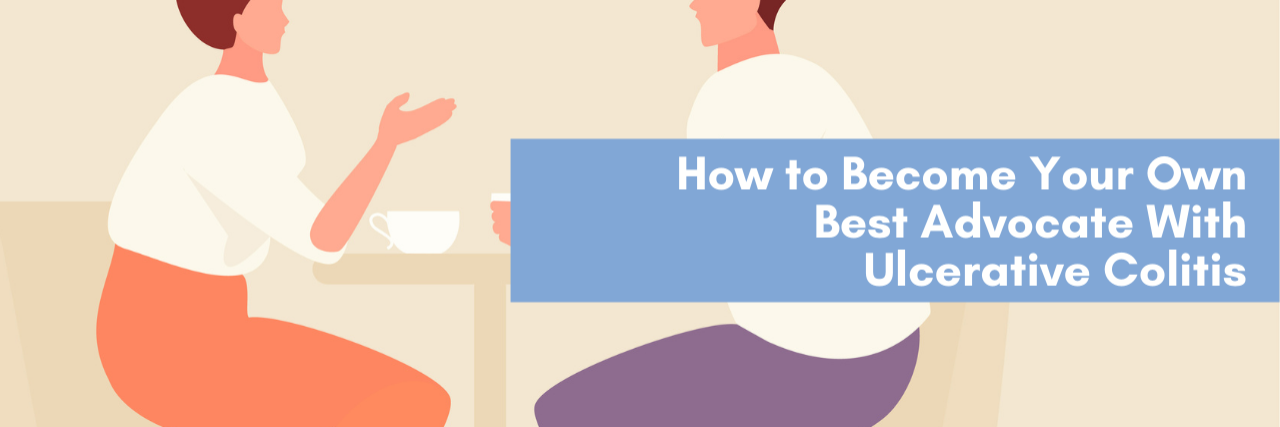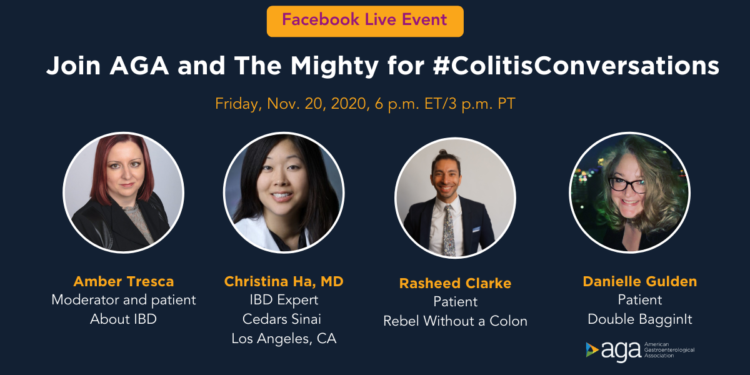I “met” Amber Tresca, founder of About IBD, on Twitter a few years ago — thanks to the magic of hashtags. We were both diagnosed with ulcerative colitis (UC) as teenagers, and Amber had j-pouch surgery 10 years after her diagnosis. Amber is one of the most active voices on social media when it comes to raising awareness for life with UC. Her “About IBD” podcast is one of my favorite go-tos when it comes to hearing stories, gathering knowledge and feeling more connected.
UC is a type of inflammatory bowel disease (IBD) that causes irritation, inflammation and ulcers in the large intestine. It is a chronic condition, which currently has no cure. I was grateful to chat with Amber face to face (over Zoom) about all things UC, particularly as they relate to your relationship with your gastroenterologist (GI). If you read my conversation with Dr. Rajeev Jain, he provided a helpful picture of what a GI wants to accomplish with their patients: a two-way, trusting, collaborative relationship. Amber shares the same sentiment with her own feedback on what the future of treatment will hopefully look like. We also talk about what’s needed in a GI’s office and how those living with UC can be greater self-advocates. Here are her thoughts on…
…peoples’ biggest fears after an UC diagnosis.
Many of us haven’t actually heard of UC before. So that diagnosis is the first time that you’re hearing these words. Maybe you’ve heard “colitis,” but colitis can mean a completely different thing. And I think in a lot of cases, it’s not made clear to people right away that the disease is chronic in nature. That’s another thing that might come as a bit of a surprise, because colitis symptoms can sometimes appear to be temporary. All colitis is, unfortunately, forever. So I think what follows is most people think about the digestive symptoms that they’re experiencing. The next thing is that they wonder if they’re ever going to need surgery. A lot of people are concerned in the beginning that they might actually need a permanent ileostomy, which of course is not true for the majority of patients.
…self-advocacy.
When you’re living with a chronic illness, I think it’s important to learn as much as you can. And for some people, their doctor says that the patient is more often the expert in their disease than the healthcare providers. But everyone is going to have their own tolerance for learning about IBD; it might depend a lot upon the severity of their disease. Some people do really well from the very beginning, after that first flare. They might not feel that they need to spend a lot of time doing outside research, because their disease is really well-managed, and that’s fantastic. But I think it’s always a good idea to spend a little bit of time doing research. Everyone’s disease is individualized, so ask your healthcare team for recommendations on where to learn more about IBD so you have good quality, specific-to-you information.
…what’s missing in GI appointments.
IBD is so complicated. For those of us who have had severe disease, we often spend all of our time dealing with the signs and the symptoms that are super urgent. We don’t necessarily get around to all of those other things. IBD affects the whole person, and that is something to think about when you come in for your regular six-month or yearly checkup, when the urgency is lower. That’s the time when you need to be thinking about things like sleep, sex, mental health, family planning, and also things like how IBD is affecting you financially, which often gets left behind in the discussion. We think, Did I reach my deductible? What is covered now? It’s a constant catchup game.
I’m fortunate in that, a lot of times, my providers will tell me how much something will cost. But that’s not always the case for me or for anyone else. Doctors can prescribe medications all they want, but I can’t pay for it sometimes. I think that’s something that we need to think about more, and gastroenterologists need to think about it more and ask their patients how they’re doing with the costs.
…the importance of transparency.
If you had asked me when I was first diagnosed, open dialogue would have meant a totally different thing than it does now, as a 40-year-old and mother of two. For me, open dialogue means everything is on the table. UC is a personal disease. We’re talking about things that nobody wants to talk about. And we have to really trust our care team in order to open up to them and have that two-way conversation.
I think GIs need to ask the right questions directly too. Many people living with IBD have told me that their doctors never ask them about their sleep patterns or if they lose control of their bowels, which is a really important question! I was working with a group and talking about surveying patients. One of the questions said something about experiencing leakage. This happens to IBD patients, and they don’t get asked about it.
We’ve all had the experience of going into the GI’s office and hearing medical jargon, and sometimes it would be better if things were explained more plainly. Of course, I think it’s important to know the name of the drug you’re on or the exact name of your condition. But it’s also important to have that explained in very plain language. Doctors have to be comfortable with a patient saying, I don’t know what that means; you need to back up and explain it a little bit more. I think healthcare providers sometimes need a little more intuition on their part.
…speaking up if you disagree with your treatment.
Patients may not recognize that they have the ability and right to say no. We have something now called “shared decision-making,” which we all need with our healthcare team. The GI is the expert in the disease, but the patient is the expert in their disease and their life. It can feel daunting to disagree, but what good is it if you get a prescription that you never plan on filling? Or if you get an order for a test that you can’t afford or don’t want to get done?
The doctor needs to know why you don’t want to take a particular drug or why you aren’t interested in changing your diet. Unfortunately, this does put some of the onus on the patient to speak up, but it’s important to remember that your doctor has seen and heard it all. You won’t be the first patient to tell them, “Look, I’m never taking prednisone again.” So you just need to say it and get it out there.
Physicians need to also recognize when their patients are displaying reluctance to follow the care plan. Instead of treating it like non-compliance, they should get to the heart of why they feel reluctant. I believe that, in most cases, you can find a way to work together still. Whatever the situation is, you can usually work it out; there’s usually an alternative.
…the struggle to find the right GI.
One of the most frequently asked questions in patient groups is, Does anybody know a good doctor in XYZ state? I’ve also talked to providers about this; I think sometimes the issue is the complication of IBD. The amount of information and research that’s coming out now has just exploded, which is why we now have more healthcare providers that pretty much specialize just in IBD.
I think the other side of it is just communication. Patients are regular people; nobody pulls us aside and says, You have a chronic condition, and here’s how you manage a chronic illness. Sometimes it’s also difficult to know who to go to for a specific issue. Who do I call about this? Is it my gastro? Is this my urologist? Is it my OB/GYN? Sometimes we get bounced around with our symptoms. In that case, I think our physicians are looking to us to be vocal about what our wants and needs are, and it’s not always easy to do that. We have this gap, and we need to find a bridge across this gap. That bridge is going to be different for every patient-provider pair. But at the very heart of it, it boils down to communication.
…the future of UC treatment.
The biggest thing would be personalized medicine. So many patients bounce from drug to drug. Maybe the first one doesn’t work, so you go on something in a different class that has a completely different mechanism of action. Why is that? Why did my friend get on a medication that has worked for a very long time, but I start on that same medication, and it doesn’t work for me? What I want is for us to understand why these drugs work, then understand why they work for certain patients and not others. Then, when you leave the GI’s office, the plan works because this class of drugs has the best chance of working for your disease. We are no longer throwing spaghetti at the wall. That’s what I want, and we are getting there.
I think most patients don’t realize how many clinical trials go unfilled because they can’t find enough patients to participate. But we’re getting the funding filled, research done and attention that’s deserved. Research is also increasing in all kinds of demographics, not only in the United States, but also across the world. So the future is bright for UC and IBD treatment.
Note: This interview was edited for clarity and length.
Learn more here.



